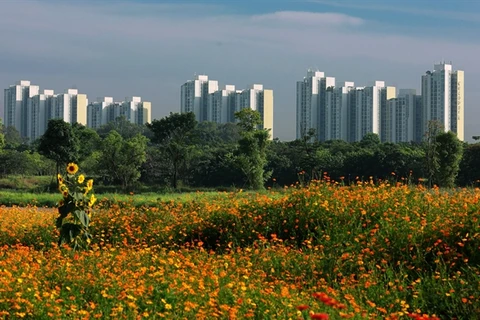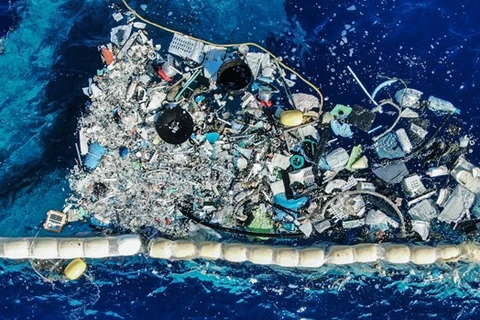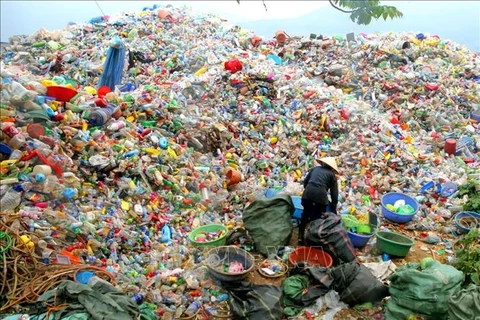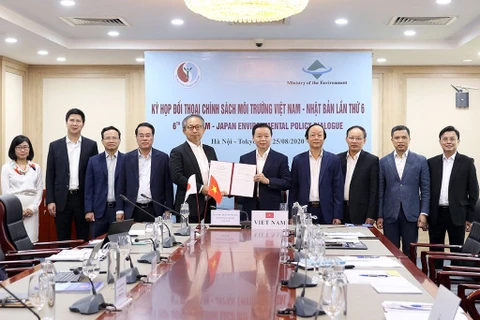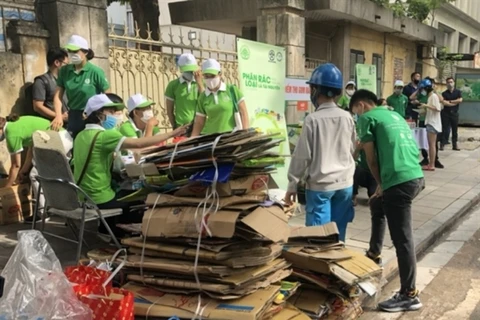HCM City (VNS/VNA) - Rapid urbanisation and high population density are putting pressure on Ho Chi Minh City in the management and treatment of waste.
According to the municipal Department of Natural Resources and Environment, about 9,200 tonnes of solid waste is released a day, mainly from residential areas, offices, hotels, restaurants, manufacturing facilities and markets.
The solid waste released in the city increases by 5 percent each year.
In the first eight months of 2020 alone, the amount of solid waste increased by nearly 10 percent and is expected to increase to 13,000 tonnes a day by 2025.
Notably, there is more bulky household waste and large items such as broken tables, salon chairs, beds and wardrobes dumped on roads, making garbage collection more difficult.
Le Truong Tuan Anh, head of the Solid Waste Management Division under the HCM City's Department of Natural Resources and Environment, said one of the problems for solid waste management is the classification of waste at its source.
The city People's Committee issued regulations on the classification of solid waste at the source two years ago, but many households still do not sort their waste.
Ineffective communication has limited the proportion of people participating in solid waste classification, Anh said.
The collection and transportation of rubbish face many difficulties when most people have the habit of disposing of solid waste in front of their houses on the sidewalk, while the management of private trash collectors in some districts is not strict.
Many trash collection units fail to collect at prescribed times and their equipment is substandard, leading to wastewater leaks, according to Anh.
The lack of human resources also affects the inspection, monitoring and sanctioning of solid waste transportation activities.
Poor treatment capacity has caused odours, residual garbage and non-decomposition, harming the environment, he said.
Recycling and waste treatment plants currently do not meet technical requirements and recycle only 40 percent of waste, while the recycling of waste into compost faces many obstacles due to the unstable consumer market.
According to Dr Pham Viet Thuan, director of the Institute of Natural Resources and Environment Economics, HCM City should prioritise improving people's habits and awareness of waste classification at the source.
This will make it easier to dispose of as domestic solid waste in Vietnam is mostly organic waste, Thuận said.
Conversely, if inorganic and organic waste are buried together, they will not be able to fully decompose, creating methane (CH4), which is 28-36 times more toxic than carbon dioxide (CO2).
In addition, organic waste, if exposed to metal components of inorganic waste, can easily produce a poison called leachate, affecting groundwater.
Propaganda activities need to be maintained for a long time and sanctions for violations should be given to make waste classification a habit in people's daily life, said Thuan.
The city also should launch programmes to exchange waste for gifts to encourage people to sort rubbish, he said, adding that the city should consider using advanced technology to generate electricity from garbage instead of burying it in landfills.
Together with promoting the separation of garbage at source, the city needs to complete the collection system and separate the transportation of solid waste from other types of waste, according to Cao Van Tuan from the Urban Environment One Member Ltd Company.
The city needs to reconsider construction waste collection as it is currently collected together with domestic waste, causing difficulties in treatment.
The Department of Natural Resources and Environment said it will work with the People's Committees of districts to promote communication and call people to classify solid waste at the source. The private waste collection units can be rearranged or changed to co-operatives or businesses for better management./.
According to the municipal Department of Natural Resources and Environment, about 9,200 tonnes of solid waste is released a day, mainly from residential areas, offices, hotels, restaurants, manufacturing facilities and markets.
The solid waste released in the city increases by 5 percent each year.
In the first eight months of 2020 alone, the amount of solid waste increased by nearly 10 percent and is expected to increase to 13,000 tonnes a day by 2025.
Notably, there is more bulky household waste and large items such as broken tables, salon chairs, beds and wardrobes dumped on roads, making garbage collection more difficult.
Le Truong Tuan Anh, head of the Solid Waste Management Division under the HCM City's Department of Natural Resources and Environment, said one of the problems for solid waste management is the classification of waste at its source.
The city People's Committee issued regulations on the classification of solid waste at the source two years ago, but many households still do not sort their waste.
Ineffective communication has limited the proportion of people participating in solid waste classification, Anh said.
The collection and transportation of rubbish face many difficulties when most people have the habit of disposing of solid waste in front of their houses on the sidewalk, while the management of private trash collectors in some districts is not strict.
Many trash collection units fail to collect at prescribed times and their equipment is substandard, leading to wastewater leaks, according to Anh.
The lack of human resources also affects the inspection, monitoring and sanctioning of solid waste transportation activities.
Poor treatment capacity has caused odours, residual garbage and non-decomposition, harming the environment, he said.
Recycling and waste treatment plants currently do not meet technical requirements and recycle only 40 percent of waste, while the recycling of waste into compost faces many obstacles due to the unstable consumer market.
According to Dr Pham Viet Thuan, director of the Institute of Natural Resources and Environment Economics, HCM City should prioritise improving people's habits and awareness of waste classification at the source.
This will make it easier to dispose of as domestic solid waste in Vietnam is mostly organic waste, Thuận said.
Conversely, if inorganic and organic waste are buried together, they will not be able to fully decompose, creating methane (CH4), which is 28-36 times more toxic than carbon dioxide (CO2).
In addition, organic waste, if exposed to metal components of inorganic waste, can easily produce a poison called leachate, affecting groundwater.
Propaganda activities need to be maintained for a long time and sanctions for violations should be given to make waste classification a habit in people's daily life, said Thuan.
The city also should launch programmes to exchange waste for gifts to encourage people to sort rubbish, he said, adding that the city should consider using advanced technology to generate electricity from garbage instead of burying it in landfills.
Together with promoting the separation of garbage at source, the city needs to complete the collection system and separate the transportation of solid waste from other types of waste, according to Cao Van Tuan from the Urban Environment One Member Ltd Company.
The city needs to reconsider construction waste collection as it is currently collected together with domestic waste, causing difficulties in treatment.
The Department of Natural Resources and Environment said it will work with the People's Committees of districts to promote communication and call people to classify solid waste at the source. The private waste collection units can be rearranged or changed to co-operatives or businesses for better management./.
VNA

